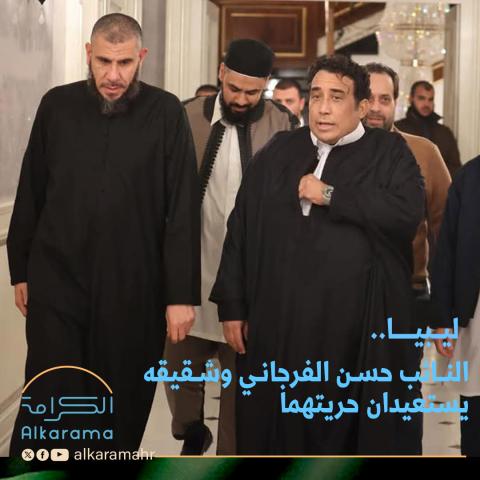
Alkarama confirmed the release of Libyan parliament member from Tarhuna, Hassan Salem (also known as Hassan al-Farjani Salem Jaballah) and his brother Mohamed, as per a decision by the President of the Presidential Council, Mohamed al-Menfi. The two brothers are to remain under supervision.
Their family expressed its gratitude to Alkarama for its attention to the case through its engagement with UN procedures and media coverage of the issue.
On 10 July 2024, Alkarama referred the case of Hassan Salem, a member of the Libyan Parliament, and his brother Mohamed Salem to the UN Working Group on Arbitrary Detention (WGAD). The two were arrested by the Special Deterrence Force (RADAA) militia and detained at the Mitiga airbase under its control.
On 15 October 2024, Alkarama addressed again the Working Group regarding developments in the case after the Third Chamber of the Permanent Military Court in Tripoli sentenced Hassan Salem to 10 years and 6 months in prison on alleged charges of collaborating with members of the "Kaniyat" militia in the killing of eight people in an armed attack on the al-Rawajh area of Tarhuna in 2017. This charge was denied by social figures, who issued a statement confirming that Salem had worked to end the fighting and mediate between the warring parties, contrary to the basis of the military court's sentence.
The family of the two brothers reported that the military court's sentence was based on confessions extracted under torture and witness testimonies, one of whom later recanted. They further stated that the victim had disclosed his torture to the judge in the military court, but the judge disregarded his complaints and proceeded with a non-appealable verdict.
Background of the Case
On 27 February 2023, shortly after leaving the headquarters of the Libyan Administrative Control Authority in Tripoli, Hassan Salem was abducted in public by the RADAA militia without a warrant or explanation and was taken to Mitiga, where he was held incommunicado and deprived of any contact with the outside world for more than two months. His family was first allowed to visit him on 9 May 2023. They reported that they were allowed only one more visit, losing all contact with him since March 2024. Hassan Salem was also deprived of legal representation until his first hearing before the al-Farnaj Military Court on 22 May 2023.
At this hearing, he was informed for the first time of the charges against him, including "joining a criminal gang." During this session, his lawyer raised the issue of his parliamentary immunity, presenting an official letter from the Libyan Parliament requesting his release and arguing that the military court had no jurisdiction over a civilian. Despite the prosecutor's request for his release, the court, under militia pressure, ordered his continued detention, which led to his sentencing.
Arrest of Brother Mohamed Salem
On 31 September 2023, the RADAA militia arrested Mohamed Salem upon his arrival at the al-Farnaj Military Court to attend his brother's trial. He was immediately taken to Mitiga prison, where he was held incommunicado until 19 January 2024—three months—before his first family visit. During this visit, his family noticed signs of beating and injuries on his face and hands. He was allowed only four visits during his detention, and the last contact his family had with him was in late May 2024. His family-appointed lawyer was not allowed to visit him or review his case file. The prosecution claimed it had no record of his detention, and he had not undergone any judicial procedures.
Alkarama's activism
Given the severe violations of the basic rights of both victims, their families had no choice but to turn to Alkarama to request the intervention of UN experts and call on the Libyan government for their release. Alkarama emphasized in its report that the deprivation of the two brothers' liberty had no legal basis and was in violation of both international and Libyan law. Alkarama highlighted all the violations the two brothers had faced since their arrest and urged the independent experts of the Working Group to recognize the arbitrary nature of their detention.
Responsibility of the State for the Violations of the RADAA Militia
In similar cases, Alkarama has called on the Working Group to recognize the Libyan government's responsibility for the actions of the RADAA militia. A lthough the militia has its own command structure, it is under the authority of the Ministry of Interior and the Prosecutor General, and it receives funding from the government. Therefore, the government is fully responsible for its actions.
Alkarama has consistently called on the Libyan government to ensure that the militia and all unofficial detention sites fall under its effective control.
